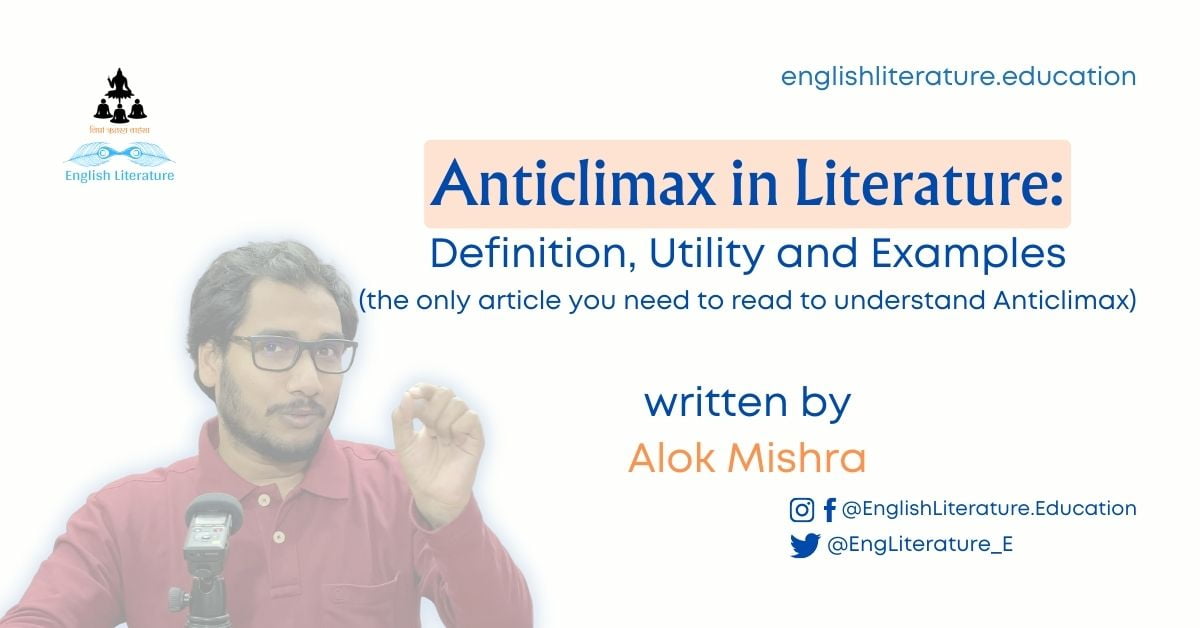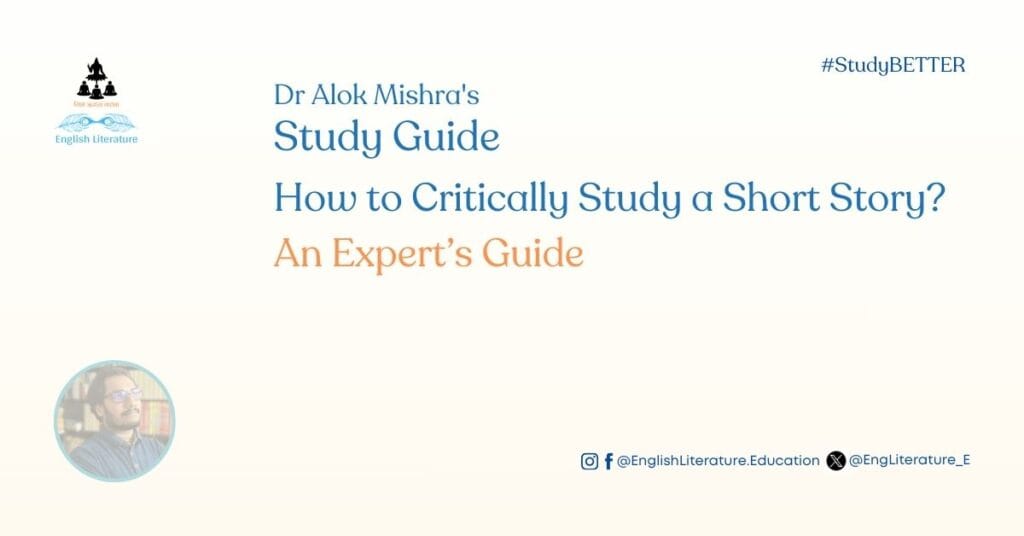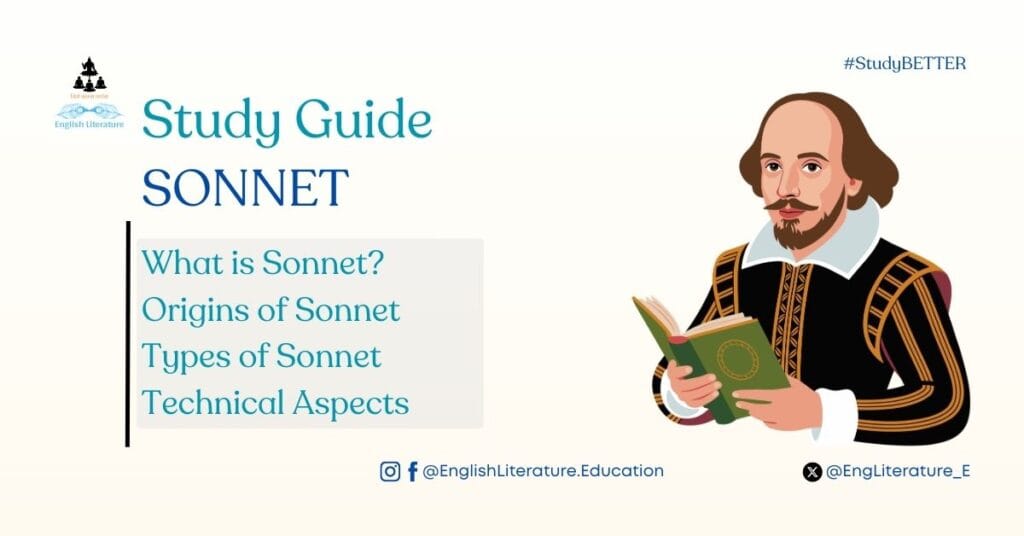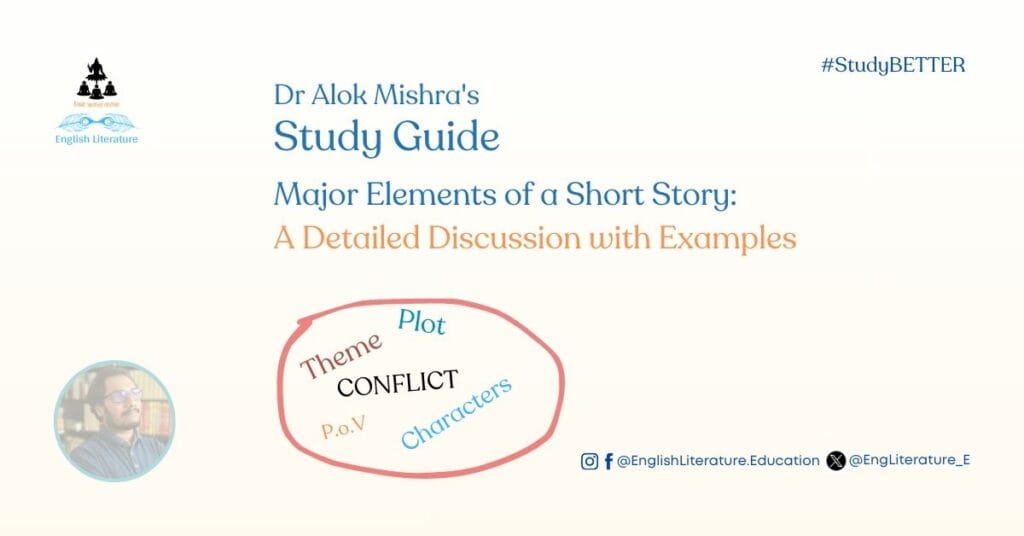In this article, we will learn about Anticlimax. Anticlimax is largely believed to act as a literary device. However, beyond being a literary device used by authors and poets, Anticlimax is also a concept and Anticlimactic is an adjective that serves as a feeling of surprise (mostly as depressing or negative or humorous) when something results in pale colours than what it might have promised to be in the beginning. I hope you may have a glimpse of the meaning of this term already. Nevertheless, keep reading this article till the last line as we will get into the depths of the ideas and interpretations, functions and dimensions, the utility of this term in the literature, and other necessary details you should know as a student of English literature. So, let’s begin to learn about the literary term Anticlimax!
Introduction:
Let us begin with a general introduction to the term Anticlimax. As you may have gathered from the hint in the section before this introduction, the concept of anticlimax serves as a powerful tool to disrupt readers’ expectations and create striking narrative effects. Anticlimax refers to a deliberate (conscious) shift from an anticipated or intense conclusion (or resolution) to a less significant or underwhelming resolution. By doing so, that is sporting with the traditional narrative structures – less intense to more intense, authors employ anticlimax to challenge reader assumptions, convey irony (read: irony in literature), provide social commentary, and evoke emotional responses in addition to experimenting with the very form of literature, which is a rather apparent use of Anticlimax. Now, we will discuss Anticlimax within the literary framework, its usage and the scope of this literary device along with the opinions of literary scholars on this concept. Let us begin with a simple definition of this literary term Anticlimax.
Definition of Anticlimax, the literary term:
Anticlimax refers to a narrative or rhetorical device (also known broadly as a literary device) that involves a sudden (totally unexpected and unpredictable in many cases) shift from an expected or heightened climax to an underwhelming one, often for the purpose of creating a surprise, irony or subverting the expectations of readers. The episode of the introduction of Anticlimax creates a stark contrast between the buildup of tension and the ultimate outcome and thus leaving the audience feeling disappointed or disoriented. Practical examples of Anticlimax may include a mystery novel where the detective solves the case offhandedly without any dramatic confrontation, a film that builds up a high-stakes battle only for it to end abruptly with no clear resolution or a joke that sets up a grand punchline but delivers a lacklustre or unexpected ending, leaving the listener amused by the unexpected twist. In a literary context, if you have read the novel by J. D. Salinger, The Catcher in the Rye, you must have been intrigued by a rather anticlimactic conclusion that involves Mr Antolini, the teacher, patting Holden Caulfiled on the head while he sleeps. The story by the novelist promises a rather intense climax with some philosophical or intense exchange of dialogues between the two characters. However, the ending just betrays the entire build-up! Likewise, if you remember watching Hamlet on the stage or reading this play by Shakespeare, you must remember the ending of the drama. While the audience is rooting for Hamlet to pursue his revenge, and as the plot promises, the ending just leaves the audience with a moment of surprise and frustration.
Understanding Anticlimax – what scholars say:
Other than what you have read in the section above, you may use these details to understand Anticlimax in simple terms. Anticlimax can also be defined as a narrative technique that involves a sudden drop or deflation of tension, often occurring at a critical point in a story (of a novel, play or even a long poem). It just presents an inverted reflection of the buildup of expectations, disrupting the traditional trajectory of rising action, climax, and resolution. This intentional deviation from a conventionally satisfying resolution challenges readers to reconsider their assumptions and engages them on a deeper level (Miall, 2006).
Functions of Anticlimax in Literature – according to the authoritative books:
1. Subversion of Expectations: Anticlimax, as a literary tool, allows authors to deviate from conventional storytelling by consciously withholding or defying the expected climax. As expected, this subversion creates surprise, disorientation, and forces readers to reevaluate their assumptions about the narrative (Abbott, 2008). And therefore, authors may achieve the desired literary effect of pushing their audience into a state of contemplation about everything they just witnessed.
2. Irony and Humor: Anticlimax can be employed by authors and poets for comedic effect, relying on the stark contrast between expectations and reality. Through unexpected and underwhelming resolutions, authors can generate humour, satire, and irony, highlighting the disparity between anticipated outcomes and actual events. Satirical and mock-epic narratives like those by Alexander Pope, Shadwell and Dryden may be well-thought examples of this effect generated by employing Anticlimax for humour and irony.
3. Social Commentary and Critique: Scholars also believe that Anticlimax can be a powerful tool for social commentary, challenging conventional narratives and exposing the gap between idealised outcomes and harsh realities. By intentionally undermining expected resolutions, authors can critique societal norms, power structures, or cultural expectations (Jeffreys, 1990). Amitav Ghosh’s novel The Hungry Tide offers a few occasions of such anticlimactic results. Jane Eyre by Charlotte Bronte, many critics argue, offers an anticlimactic conclusion by showing Jane returning to Thornfield Hall to accept Mr Rochester (in his dilapidated condition).
4. Emotional Impact: Anticlimactic moments can evoke a range of emotional responses in readers, including disappointment, shock, or even a sense of absurdity. By defying expectations, authors create a visceral experience that lingers with the reader, provoking reflection and contemplation. Hamlet’s unfinished revenge or a novel that largely remains unfinished, German author Daniel Kehlmann’s 2016 novel You Should Have Left are prime examples of anticlimactic endings leaving an emotional impact on readers.
Examples of Anticlimax in Literature to Understand the Usage of This Literary Device:
1. The Great Gatsby by F. Scott Fitzgerald: The novel culminates in a highly anticipated confrontation between Jay Gatsby and Tom Buchanan. While readers believe and expect there will be some intense ending to the confrontation, their expectations go for a toss! An unexpectedly anticlimactic conclusion mars the build-up of the narrative hitherto and it leaves readers bemused and (perhaps) intrigued. This Anticlimax, as it seems and many literary critics have argued, serves as a commentary on the illusion of the American Dream and the emptiness of material pursuits. So, we can say that the novelist Fitzgerald may have used Anticlimax to critique the vain pursuit of material accumulation.
2. Animal Farm by George Orwell: A famous and intriguing novel by Orwell, Animal Farm, has a lesson for all of us in its Anticlimactic conclusion. In the final chapters, the animals’ rebellion against their oppressive human masters ultimately (and cunningly) leads to a shift in power from one group of animals to another. And thus, the initial hopes for a utopian society crumble as the new leaders replicate the same oppressive systems, resulting in a famous anticlimactic realisation of the cyclical nature of power and corruption.
Hope you have understood the usage of Anticlimax as a literary tool to achieve various desired outcomes. Now, we will discuss some opinions by experts on the nature and utility of Anticlimax and analyse the same.
Expert Opinions about Anticlimax and Analyses of the Same:
1. Miall (2006) suggests that Anticlimax can challenge readers’ expectations, leading to a more active engagement with the text and fostering a deeper understanding of the narrative. However, in general, many new or causal readers may believe that the author might have ruined their opportunity to extract aesthetic pleasure by subverting the conclusion. However, Professor Miall’s analysis does add value to the use of Anticlimax by employing that it gives readers an opportunity to engage with the text more than once – one while reading with expectations or a climax and another while rethinking after being bemused by the anticlimactic ending.
2. Abbott (2008) argues that Anticlimax functions as a subversive device, disrupting traditional narrative patterns and challenging the notion of closure, thereby promoting critical thinking and reader participation. And this argument extends the same line of thought as suggested by Professor Miall (and mentioned above). However, Professor H Porter Abbott’s argument compels us to think about cultural and social expectations – do we expect certain things to happen and take the same for granted? Can we argue that collective thinking for expected conclusions is shared by readers? That is, the leading woman should be married to the leading male character in a novel. The villain in a play should ultimately be defeated by the ‘hero’. And so on and so forth… do such expectations exist? And the answer is YES! And therefore, some authors and literary artists, do dare to challenge the collective notions of binary nature by employing the tool of Anticlimax.
Conclusion:
Thus, I hope you should have enough arguments to agree that Anticlimax serves as a powerful tool in literature, allowing authors to subvert expectations, create irony, offer social commentary, and evoke emotional responses. By using anticlimactic endings, and intentionally deflating tension and deviating from traditional narrative structures, authors engage readers on a deeper level, challenging their assumptions and inviting critical reflection. Through well-executed anticlimactic moments, literature can leave a lasting impact on readers, provoking thought, and fostering a deeper understanding of the complexities of human experience.
List of References:
1. Abbott, H. P. (2008). The Cambridge Introduction to Narrative (2nd ed.). Cambridge University Press.
2. Miall, D. S. (2006). Literary reading: Empirical and theoretical studies. Peter Lang.
3. Jeffreys, S. (1990). Anticlimax: A Feminist Perspective on the Sexual Revolution. University of California Press.
Written by Alok Mishra for the English Literature Education platform





2 Comments. Leave new
Thanks for this helpful article on anticlimax in English literature. I am a BA student and this term was very new and perplexing when it occurred in the class with reference to Shakespeare’s play Hamlet. Luckily, you have put that anticlimactic example as well. Very simple to understand. Keep writing these helpful guides and I am sure many more will benefit from them.
That is a bonus for me! I came here searching for irony in literature. Saw a link to this amazing article in anticlimax in literature. Read it and I am sure this one will help students of English literature understand the term anticlimax and its definition convincingly. Also, the examples and references from the works of literature comprehensively illustrate the scopes of anticlimax in literature and the dimensions of anticlimactic endings. Thanks again guys!